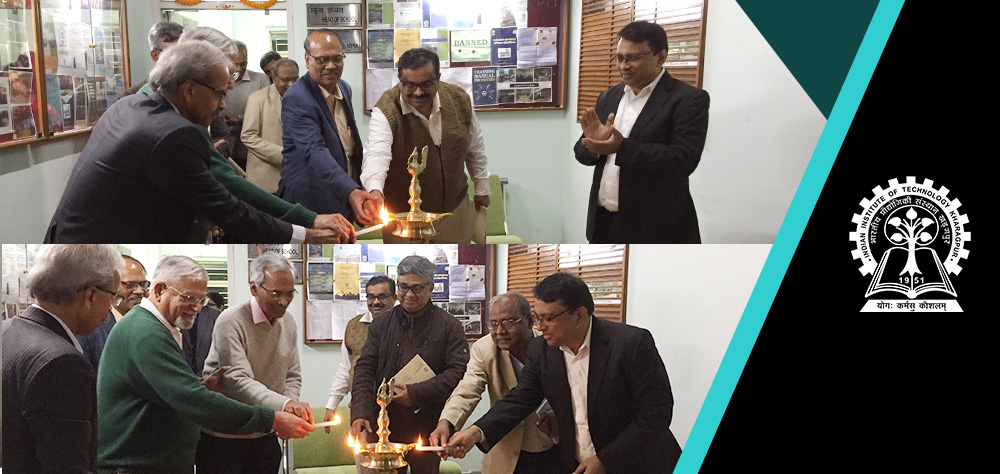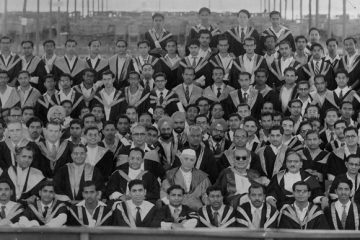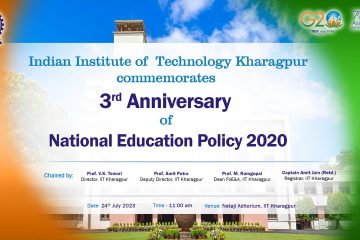
The Ranbir and Chitra Gupta School of Infrastructure Design and Management helps IIT Kharagpur develop a SMART campus
Keeping up with the Government of India’s call to develop Smart cities, the Ranbir and Chitra Gupta School of Infrastructure Design and Management is not only developing the necessary expertise, knowhow and testing facilities, but new facilities set up in the School will help IIT Kharagpur itself develop a Smart campus.
Two new laboratories were recently inaugurated at the School – the Infrastructure Monitoring and Analytics Lab and the Infrastructure Evaluation Lab. Speaking on the occasion, the Director, Prof. Tewari, said, “The newly opened laboratories will help us monitor the health of buildings, bridges and other infrastructure. These laboratories will also help us to make better operational management of cities and infrastructure. There is an enormous potential for collaborative activities with public and private bodies for infrastructural projects and civic management.”
The Infrastructure Monitoring and Analytics lab, developed in association with Webel Technologies, will help in real-time monitoring of building, bridges, roads as well as air quality, temperature, humidity, and traffic. The lab is capable of collecting real-time data using various IoT devices such as video cameras, sensors and UAV. Some of these have already been set up at various points of the IIT Kharagpur campus. The data will be mapped and used for carrying out advanced analytics, modeling, simulation, etc. to formulate management policies. The effectiveness of various proposed solutions can also be evaluated based on the acquired data.
Prof. Bhargab Maitra, Head of the School, said, “Today, given governments’ emphasis on the concept of smart cities, all management and policy decisions are evidence-based. So getting real-time accurate data – both location and time-wise – is very important. The Infrastructure Monitoring and Analytics Lab includes a campus-wide IoT framework, where we will be able to collect data using heterogeneous data sources. With this data, we will be able to find out how energy is being consumed, how the movement of vehicles is happening, the emission level, water quality, the condition of infrastructure and so on. In other words, with this, the whole campus becomes an experimental lab and various disciplines and departments can access the data to develop meaningful solutions in different application domains such as traffic, water, solid waste, energy, building, road, etc. Once we are able to do this successfully in the IIT Kharagpur campus, we might be able to scale up and think of implementing it in a city level.”
The newly opened state-of-the-art Infrastructure Evaluation Lab has equipment that will be used to carry out non-destructive testing in order to evaluate the in-situ condition of any structure or its components. Sophisticated equipment such as Impact-echo set-up, Ultrasonic Pulse Velocity test instrument, Acoustic Emission Test Set-up, MIT-Dowel Scan, portable ground-penetrating radar and other such equipment will help assess the strength of existing buildings, bridges, roads, etc. The country is developing several concrete roads. The MIT-Dowel Scan, being set up for the first time by any lab in India, will be instrumental in evaluating these concrete roads including the dowel bars placed inside the pavement.
Mr. Ranbir (Ron) Gupta, who seed-funded the School in 2008, and was present during the inauguration of the new labs, expressed his happiness about the new developments in the School and the Department’s recent emphasis on industry experience through internships that has been made compulsory from last year for M.Tech students. He added, “We are thinking about bringing in the School’s alumni and have them talk about what they are doing now, how they have gained from their training here and what we can do to further improve the training and curriculum here.”
The School’s two-year multidisciplinary M.Tech program focuses on planning, management and effective delivery of large robust infrastructure projects in the areas of transportation, power, utility infrastructure and facilities.
Over the last seven years, RCGSIDM has produced four outstanding PhDs, over 150 M.Tech students and held several international symposiums, workshops and courses with renowned institutions like Columbia University, MIT, Georgia Tech, Lawrence Tech, University of Tokyo, Tokyo Metropolitan University, Curtin University and so on. The School is closely interlinked with two major ‘Mega Projects’ namely ‘Future of Cities’ and ‘SanDHI’ which are sponsored by the MHRD, Govt of India.
The School’s work on “Smart and Integrated Pedestrian Network Design” is funded by the MHRD under the UAY (Uchhatar Avishkar Yojana) and being executed in collaboration with Curtin University, Australia, IIT-BHU, Nikken Sekkei Research Institute, Japan and GMR Group.



